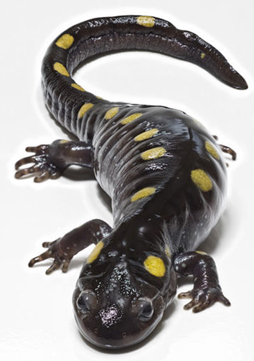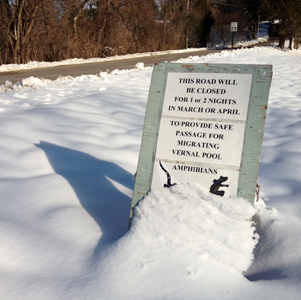Each year around this time, the Conservation Commission puts up sandwich-board signs on a couple of roads to warn drivers that the road will be closed for a night or two to allow safe passage for amphibians. Well, the signs are now up—but they’re camouflaged by snow, which is undoubtedly also puzzling the creatures who thought spring had arrived.
Spotted salamanders and wood frogs take advantage of warm wet evenings in early spring to move from uplands to vernal pools to lay eggs. Vernal pools are those that contain water only in the spring and then dry up—which is great for the amphibians in question because the bodies of water aren’t home to fish, which would eat the eggs. For the past 17 years, the town has put up the signs so volunteers can act as crossing guards on evenings when the salamanders are on the move, according to Tom Gumbart, the town’s conservation director.

In between snowstorms recently, amphibians were on the move one evening on Silver Hill Road, which was closed briefly in their defense. Now, however, the rest of them will have to wait until the snow melts to attempt the trip.
Fortunately, spotted salamanders are not an endangered species, and those in Lincoln are themselves less endangered since 2007. That’s when a new federal law decreed that daylight saving time would start on the second Sunday in March instead of the first Sunday in April. Under the old regime, amphibians would often migrate at times coinciding with the peak evening rush hour. “The amount of littler critters getting squished was horrendous,” Gumbart said.

Leave a Reply